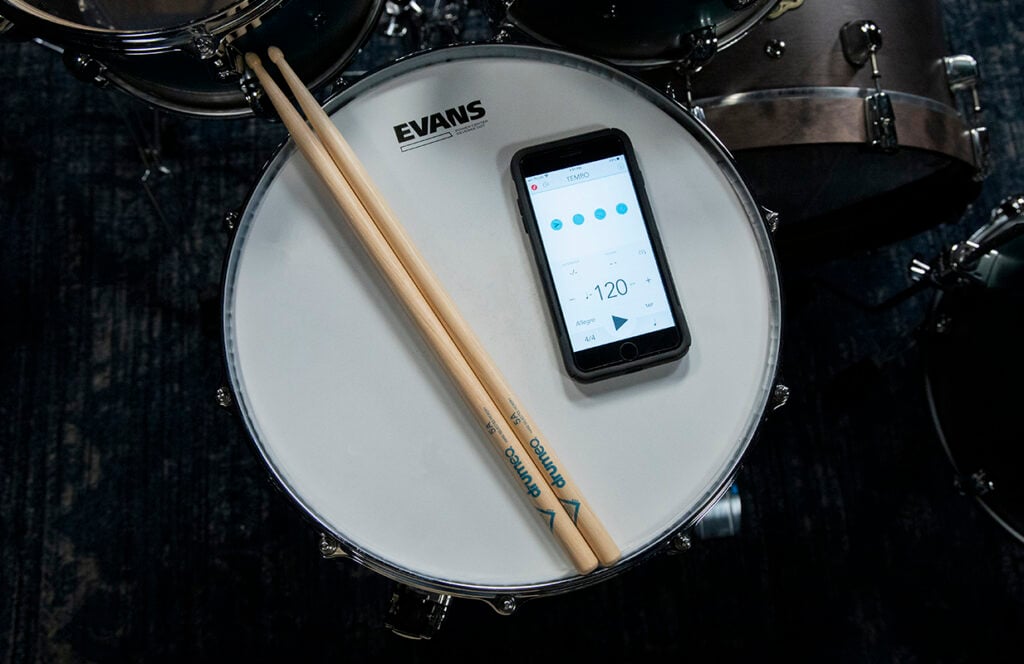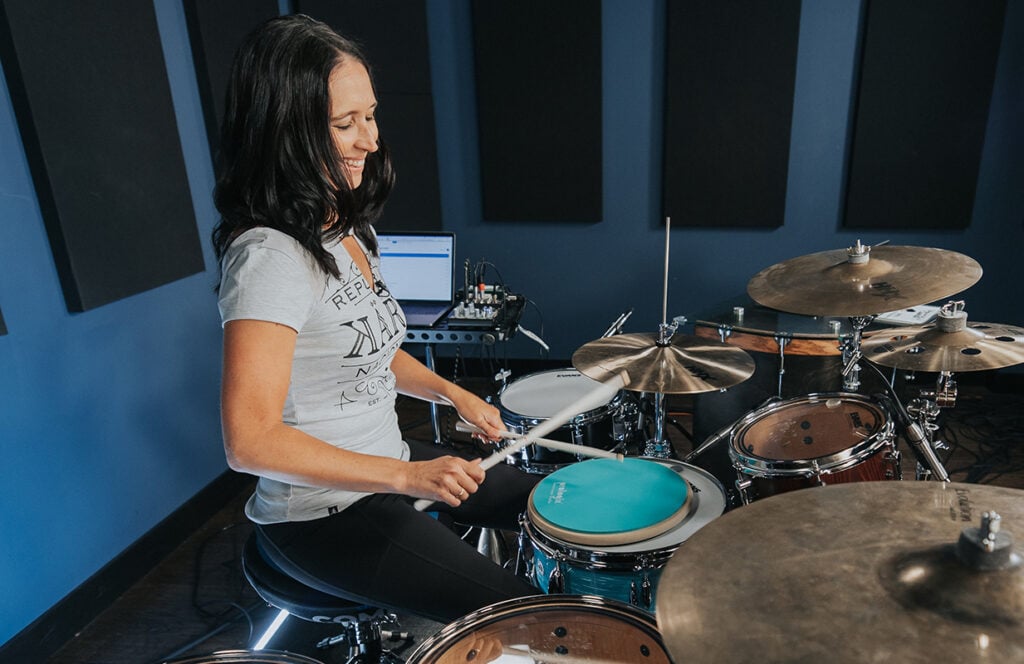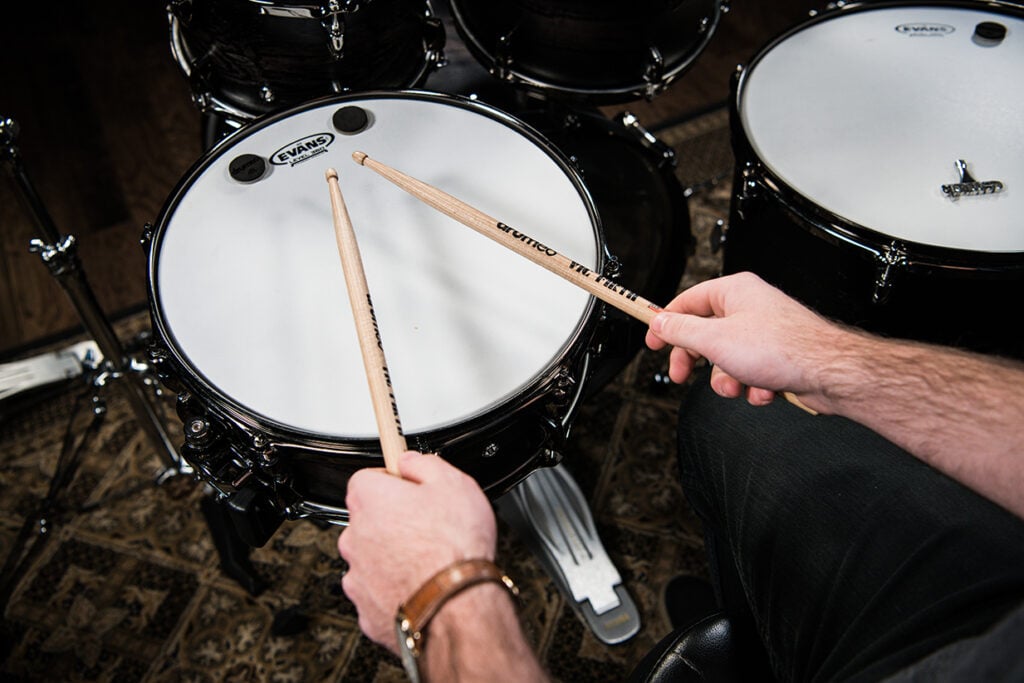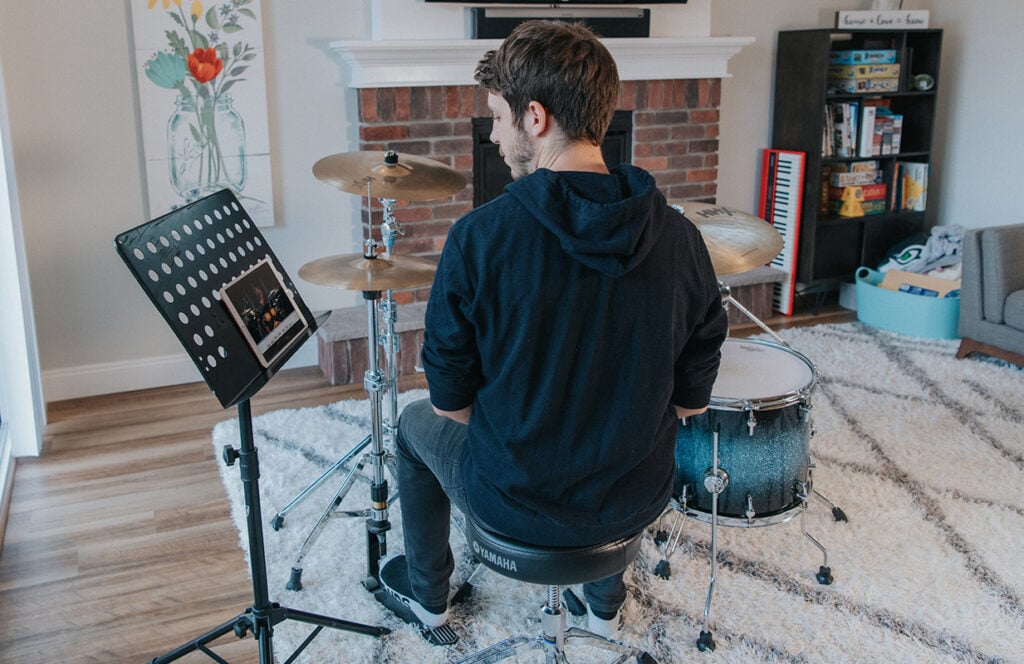The single stroke roll is the most common drum rudiment and is the first one every new drummer should learn. If you’ve been playing drums without working through the list of 40 rudiments, you’ve probably played a single stroke roll before – maybe even by accident.

In the single stroke roll, you alternate single strokes between your hands. Right hand, left hand, right hand, left. Simple as that!
Here’s what the single stroke roll sounds like:
You can use this tool to practice along at the tempo that’s best for you (it’s the one Drumeo members use when practicing with the 3000+ play-along tracks inside our members area).
► Click here if you want to learn how to read drum music
It’s one thing to play ‘right left right left’, but it’s another thing to absolutely nail the single stroke roll. It should feel and sound smooth and consistent, and both hands should be able to execute it without issue.
It may be the first rudiment you learn, but it’s used so often you should master it as early as possible. Here are some tips to play single stroke rolls.

When you’re first learning how to play something, it’s fine to test it out without a metronome as you get used to the pattern. But you shouldn’t go click-free for long. The metronome will help you develop a better internal clock and show you exactly where the timing of your strokes is inconsistent (or where it’s right on the grid).
You can buy a physical metronome at a music store or download a metronome app online.

While it might be tempting to get up to speed as quickly as possible – especially if you’re feeling confident – make sure you’re really playing the single stroke roll well before you increase the tempo.
Be honest with yourself and don’t move on until you’ve really got it down. Don’t just say “it’s good enough”. Develop control first, and speed will come later.
Try starting with your metronome set to 60 BPM and then slowly work your way up 5 BPM at a time.

If you’re a right-handed drummer, you probably default to starting single stroke rolls with your right hand. Make sure you also practice starting rolls with your left hand. This will help you get a more consistent sound out of both sticks and give you more confidence and control.

It’s easiest to correct your posture or grip immediately if you’re watching yourself in a mirror. Try to set up a practice pad and a snare stand in front of a full length mirror if you can.
Maybe your strokes don’t look even. Maybe the height of your right stick doesn’t match the height of your left. You might even notice you’re gripping your left hand too hard. Use your reflection as a window into how you’re doing. It’s like becoming your own drum teacher!

While playing in front of a mirror will help you fix issues on the fly, you might not realize when something is wrong during your practice session. Sometimes we don’t notice issues while we’re in the middle of playing – especially if we’re concentrating hard.
Whether you’re propping your phone on your dresser or capturing it all with a camera and tripod, it’s helpful to watch your practice sessions and critique yourself from a ‘third party’ perspective.
We’ve put together a playlist with drumless tracks at different tempos so you can practice the single stroke roll over real music:
Once you know how to play it on a practice pad or single drum, it’s time to move the single stroke roll over to the drum set.
The sky’s the limit for all the ways you can play this rudiment on the kit, so here are some exercises to get you started.
#1:
#2:
#3:
#4:
#5:
Once you’ve worked through these exercises, come up with your own ideas. Move the rudiment around the kit, changing surfaces and sounds. Go between a cymbal and the snare drum, or try a single stroke roll between your hands and feet.
Learn these tunes to get comfortable with this rudiment in practice:

This song is a drummer’s workout! Most of the track features a constant single stroke roll on the toms – the only difference is the accents that alternate every other bar.
Lear it first without the accents, then add them in when you’re ready.

This classic tom part was played by legendary drummer Gene Krupa and will get you swinging your single strokes. Like the previous song example, get used to playing it without the accents first if you’re a beginner drummer.

When you’re ready to take your rolls to the next level, this metal track is a great way to test your endurance and speed. Fast and relentless, it’s 32nd notes or bust!
Because the single stroke roll is the most popular rudiment, you’re going to start noticing it everywhere. From beats to drum fills, it’s hands down – pun intended – the one you want to study early on.
With enough solid practice, you should start feeling more confident in your playing. From drum beats, rolls and fills to solos, mastering the single stroke roll will get you one step closer to reaching your drumming goals.
If you’ve enjoyed this one, you’ll probably also like the single stroke four: another rudiment that’s basically single strokes in groupings of four.
Once you’ve got a good handle on the single stroke roll, the next most important drum rudiment to learn is the double stroke roll.


By signing up you’ll also receive our ongoing free lessons and special offers. Don’t worry, we value your privacy and you can unsubscribe at any time.
We use cookies for traffic data and advertising. Cookie Policy »